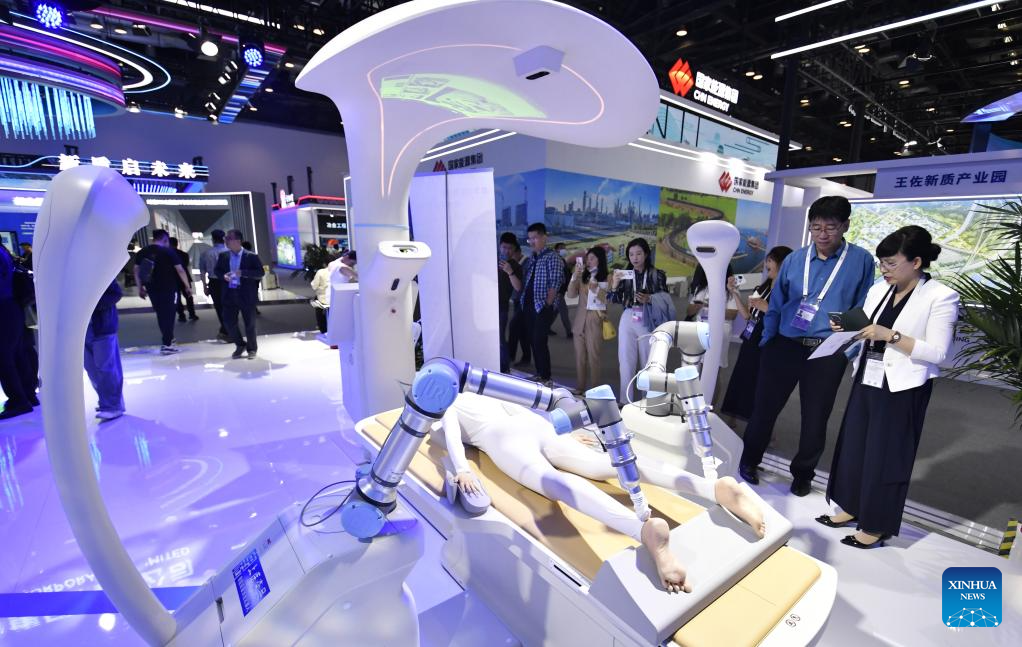Health pavilions steal show at 27th high-tech expo


Artificial intelligence is rapidly reshaping the future of healthcare, as showcased at the just concluded 27th China Beijing International High-Tech Expo, where innovations ranging from surgical robots to AI-powered traditional Chinese medicine diagnostics drew widespread attention.
At the Longwood Valley MedTech booth, a robotic arm glided over a life-size artificial leg, demonstrating a simulated knee surgery with surgical precision and drawing a steady crowd of onlookers.
According to the company, the AI-powered orthopedic system is the world's first to integrate 3D reconstruction, intelligent planning, precise execution and digital evaluation into a single workflow. It supports complex surgeries involving the hip, knee and spine — traditionally areas associated with longer durations and higher risk.
"The robot is highly intelligent and effective," said a staff member at the booth, who declined to give his name. "It can reduce a complicated three-hour operation to just 30 minutes."
Zeng Huicai, another company representative, said multiple hospitals are preparing to adopt the robot. The system is already in clinical use at several top institutions.
While surgical robots continue to revolutionize the operating room, other exhibitors focused on how AI can enhance traditional Chinese medicine.
At the booth of Guanwei Intelligent Technology, visitors lined up to try a multi-modal health scanner powered by AI. The device greeted users with a soft voice and conducted a rapid health assessment based on the TCM principles of observation, listening, inquiry and touch.
Using facial imaging, pulse sensing and a handheld grip, the system assesses vital indicators in two to three minutes. Driven by a vertical-domain AI model, it produces a personalized report with lifestyle guidance on topics such as nutrition and exercise.
Other AI-driven diagnostic devices on display analyzed meridian activity and pulse rhythms, blending ancient Chinese practices with modern technology.
"These AI doctors are convenient for managing common conditions," said a visitor surnamed Zhang. "But for serious illness, I would still want to consult an experienced physician."
The healthcare section of the expo featured more than 160 companies, with a focus on life sciences and medical innovation, said An Yongjun, an official with the Beijing branch of the China Council for the Promotion of International Trade, the expo organizer.
Beyond healthcare, exhibits spanned a range of sectors, including cell and gene therapy, brain science, neuromorphic research, AI-based diagnostics, advanced medical equipment, public health services and innovations in modern agriculture and food technology.
"I'm quite interested in the device treating cancer with X-rays," said a male visitor from Scotland. "The technologies here are impressive, and there are good opportunities for international trade from China to the world."
These technologies are gaining traction in hospitals and research institutions across the country. The annual event was held from May 8 to May 11 at the China National Convention Center in Beijing.
- Chinese scientists achieve major breakthrough in scalable quantum networks
- 1,200-seat high-speed passenger ship put into operation in Beihai, China's Guangxi
- Study explores climatic regulation of mercury deposition in plateau lake
- China to step up tough crackdown on telecom scams: senior official
- Preparations for Spring Festival under way across China
- Chinese premier signs decree to revise, repeal administrative regulations




































